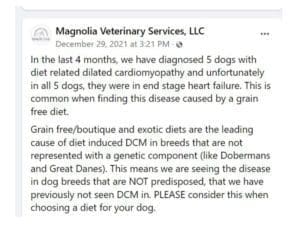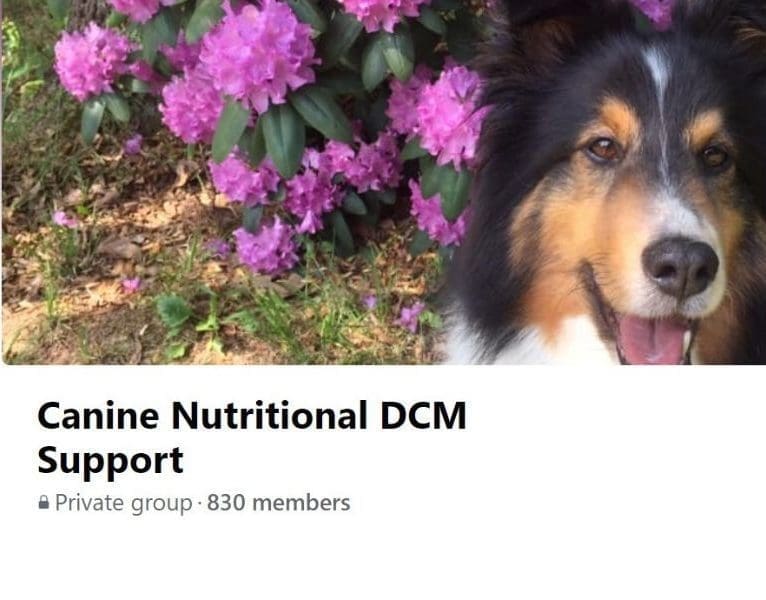Veterinarians, owners demand FDA action and transparency amid more diagnoses of DCM in dogs thought to be linked to diet
“In the last 4 months, we have diagnosed 5 dogs with diet related dilated cardiomyopathy and unfortunately in all 5 dogs, they were in end stage heart failure,” Dr. Brittany Sennett, sole veterinary practice owner in Alabama of Magnolia Veterinary Services, warned clients on the practice’s Facebook page last December. “This is common when finding disease caused by a grain free diet,” her announcement continued. “Grain free/boutique and exotic diets are the leading cause of diet induced DCM in breeds that are not represented with a genetic component.”

It has been more than eighteen months since the FDA last provided any concrete data about the fatal heart condition known as DCM (dilated cardiomyopathy) in dogs thought to be linked to certain diets — saying then that it had received 1100 + reports of canine DCM cases. “Between January 1, 2014 and July 31, 2020,” the endpoint now nearly two years ago, “the FDA received more than 1100 case reports of diagnosed dilated cardiomyopathy in dogs,” the FDA says on its website.
This was the last time any case report numbers were made public. DCM did not cease to exist in July of 2020, however. Veterinarians and impacted dog owners say the FDA has been non-responsive, even to comments they contributed to a Listening Session the FDA’s Center for Veterinary Medicine hosted on September 24, 2021, and that the time has come for the FDA to update the public:
“I’m angry, my vet is angry. I’ve been angry and incredibly sad, for three years,” Martha Martin, who owns two working labrador retrievers, both diagnosed with the disease, told the FDA’s Center for Veterinary Medicine earlier this year in comments she submitted for a Septemeber 24, 2021 Listening Session on pet food oversight. “Every story I hear of yet another dog and owner being forced into this battle crushes my soul…. Over the years I have supplied the FDA with all our echos [SIC], all the vet records and reports they have asked for,” she added. “And while I always receive a polite ‘thank you’ each time, I wish I had the confidence to believe they are taking this seriously and working diligently to get to the bottom of the issue….”
Ms. Martin’s skepticism seems well founded. When asked for an update in early January, the FDA’s Center for Veterinary Medicine provided us with the same answer we received from Anne Norris and Dr. Steven Solomon in August: “Regarding DCM reports submitted to the FDA,” FDA spokeswoman Anne Norris wrote in an August 2021 email to The Canine Review (with thirty-year FDA veteran and Center for Veterinary Medicine director Dr. Steven Solomon cc’ed), “these case documents include extensive medical records and require redaction to protect personal information of pet owners. CVM is in the process of preparing these documents for posting, and we appreciate your patience while we review and redact thousands upon thousands of pages…”
Yet six months after that August email exchange with Norris and Dr. Solomon, canine DCM reports received by FDA from members of the public beyond 2019 had still not been made available on the FDA website.
“I think it’s going to be really tricky to estimate the wait time for the items in the reading room,” FDA’s Norris told The Canine Review after first offering the explanation about how time consuming it is to redact documents. She declined to provide even an estimated timetable.
FDA senior spokespeople Michael Felberbaum and Tara Rabin also did not return calls or emails seeking comment.
Even the number of reports received by FDA has not been made available
Ours is not a surprise request, but the FDA’s response has been surprising. The Canine Review is not the first media organization to make the request for records pertaining to urgent public health. And, like other news organizations, we not only asked for records in August, but also asked for DCM records earlier in 2021, as well as in 2020. Other non-media entities – not surprisingly, veterinary professionals are chief among them – have also been pressing Dr. Solomon and his colleagues to release DCM records, including, for example, fourth year veterinary student Caitlin Holly who publishes the popular veterinary blog, “Doc of all Trades.”
The FOIA Improvement Act of 2016 requires that frequently requested documents that are not exempt from FOIA must be published on the relevant agency website and made available to the public. The documents are clearly subject to the 2016 FOIA Improvement Act’s “Rule of 3” [Agencies must “make available for public inspection in an electronic format,” records “that have been requested 3 or more times].”
We will likely need to engage FOIA lawyers for the documents.
As of press time, no DCM records had been published beyond April of 2019. As an interim, minimal step toward transparency, the FDA’s CVM could at least release the number of reports the Agency has received. Remarkably, even that number has not been made available.
Who cares?
In 2019, a group of veterinary professionals and affected dog owners formed a private Facebook support group, “Nutritional DCM Support.”

Eleven administrators and moderators are among its 830 members. The group, seen above, carefully screens its members to provide a safe space for affected owners. Veterinarians review the dogs’ records to verify the diagnosis before prospective members are admitted. The membership tally may not represent an accurate or full scope of this issue (and this reporter is unable to confirm the content of the discussions because the group really is serious about member privacy), but the group’s unusually serious and somber presence in a social media world underscores that canine DCM exists, and that it has impacted hundreds – likely thousands – of lives.
Juliana DeMarci is one of those affected owners. She submitted an essay about her dog, Bob, who succumbed to DCM, to FDA’s Listening Session on Pet Food Oversight held on September 24, 2021, writing:
“Connecting with our Canine Nutritional DCM support group and many, many owners who had experienced the same heart-wrenching loss was a therapy for me. I wasn’t the only one who was carrying so many layers of guilt. Even 2.5 years later, I think what more could I have done? How could I have not known? What was I thinking feeding him grain-free? What made me think that was the best choice?”
“The FDA’s tepid warnings regarding DCM were insufficient to warn me and the hundreds of thousands of other dog owners whose dogs are now dying from, at least in part, the grain-free food and its legume rich fillers,” Elizabeth Eilender of New York City told the FDA.
“Not knowing of the FDA warning, issued in 2018, about grain free food, I was stunned to learn that the food I had been feeding both my beloved dogs since puppyhood had apparently caused them to develop a fatal heart disease,” Martha Martin told the FDA in September. “No one but those of us who have been forced to confront this unconscionable situation can fully comprehend the devastating impact of being told that the expensive food you chose to nourish your dogs was, in fact, slowly killing them.”
A final note
Among government agencies the FDA has always had a well-deserved reputation for being exceptionally transparent across the large range of its activities and responsibilities. For example, its website contains a wealth of documents and data related to its work evaluating drugs and inspecting drug manufacturers. And it is also true that with the pandemic the agency’s workload has been overwhelming. In that sense its non-responsive, opaque handling of DCM reports and the FOIA Improvement Act’s requirement that they be disseminated publicly is especially noteworthy.
More references and context to follow. Veterinary professionals and owners should continue to report DCM cases thought to be caused by diet to the FDA here.
For your reference:

